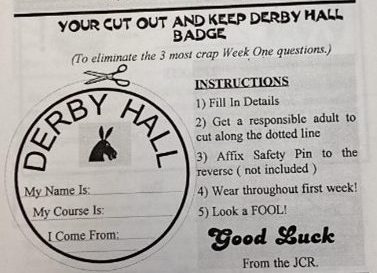
September 5, 2024, by Sarah Colborne
Extra mirrors and sewing rooms: “the civilising effect of female company upon the male population” in mixed halls of residence
Student placement Alice Lilley writes about her work on the Derby Hall archive at Manuscripts and Special Collections and what struck her about how student life has changed since the 1960s.
As a volunteer through the Arts Work Placement module, I worked on the Derby Hall Collection for Manuscripts and Special Collections. This was an incredible opportunity which helped me build invaluable experience and skills to develop my employability while experiencing what a career in the heritage sector could be like. On my first day my supervisor took me on a tour of the building where I got to see behind the scenes of the archives and understand how its material is stored and looked after before I started my work on the Derby Hall Collection. It also showed me the scope of the work MSC carry out and how it extends far beyond the University itself and demonstrated the importance of this work for the preservation of local history.
The task
Alice at work in the Manuscripts reading room:
The work I carried out, which built on that of previous volunteers, supported the development of the Derby Hall Collection as a usable resource for readers. My tasks included sorting through uncatalogued boxes of loose material from Derby Hall, cataloguing them in a spreadsheet, and writing titles and descriptions for them in order to make them accessible to readers. My final task was to choose categories to sort all of the documents into, which I then developed and narrowed down, deciding what material was important to include in the collection while removing other less relevant material. These tasks all helped develop an uncatalogued collection of different types of documents into a fully catalogued collection that would become part of the wider University Archives available for people to use.
Exploring the archive
The collection included documents covering various parts of life in the University’s halls of residence. Documents detailed the experiences of staff and students as well as recording the daily running of the hall from its completion in 1963 to the present day. One of the most prominent figures in the collection is the hall’s Warden, a post which has been filled by several people since the hall was opened. The collection documents everything involved in the running of the university’s halls of residence that goes on behind the scenes, such as maintenance, catering, finance, discipline and marketing. There is a wide range of different types of documents in the collection, such as financial documents, meeting minutes for committees such as the Warden’s Committee, student publications, promotional materials such as photographs and leaflets, records of the maintenance of the hall and its grounds, correspondence between staff such as handwritten letters and emails, as well as some personal letters and documents of individuals such as the hall’s Warden.
- Flyer for a Paté and Plonk party at Derby Hall in 1982. From UL/H/2.
- Cover of an issue of the Derby Donkey student newsletter, 1994 (UONC Periodicals Not 5.G12 DER)
- Page from an issue of the Derby Donkey student newsletter, 1994 (UONC Periodicals Not 5.G12 DER)
What I found most interesting about working on the collection was the opportunity to learn about how university life has changed over the years. I particularly enjoyed reading about nightlife and ended up going down my own research rabbit hole of student nightlife in Nottingham across the decades. Student-made publications, such as a newsletter for freshers called the Derby Donkey and a yearbook from 2002, as well as photographs, were particularly interesting to me as a current student because they provided unique snapshots in time of what student life was like.
Mixed halls
Derby Hall was one of the University’s first mixed-gender halls of residence and the various documents I found covering the creation of and transition to mixed halls in the 1960s were very interesting and represented how much attitudes have changed since then.
Some extracts from a report on the introduction of mixed halls at the University, 1966-7 (from UL/H/2/2/1/6/1-3). Click on each image to read the text:
Reflections
I learned a great deal over the course of this placement and I was able to develop key employability skills that will be useful for any career, such as organisation and communication skills, as well as industry-specific skills, training and experience that will be important in helping me pursue a career in the heritage sector. Being able to experience what a career in an archive would be like helped me to develop career aspirations and goals, therefore helping me prepare for the transition from university to the world of work. Overall, I thoroughly enjoyed working with everyone at MSC and had a lot of fun while learning a lot of new skills in a friendly environment. I was able to develop my career ambitions and employability through learning new skills and developing existing ones, as well as building experience in the heritage sector.
Accessing the archives
- The archive of Derby Hall can be accessed in the Manuscripts and Special Collections Reading Room at King’s Meadow Campus, along with the archives of a number of other halls including Florence Boot, Hugh Stewart and Cripps.
- The catalogue for the collection (UL/H/2) can be viewed online
- Look out for our new digital galleries about the histories of the University’s halls of residence – more to follow!
We would love to document student life at all halls of residence today so do send us your photos and flyers by emailing mss-library@nottingham.ac.uk.
No comments yet, fill out a comment to be the first

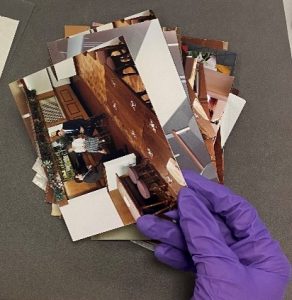
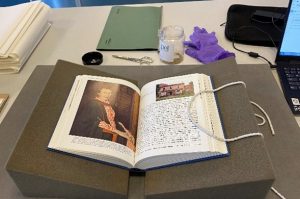
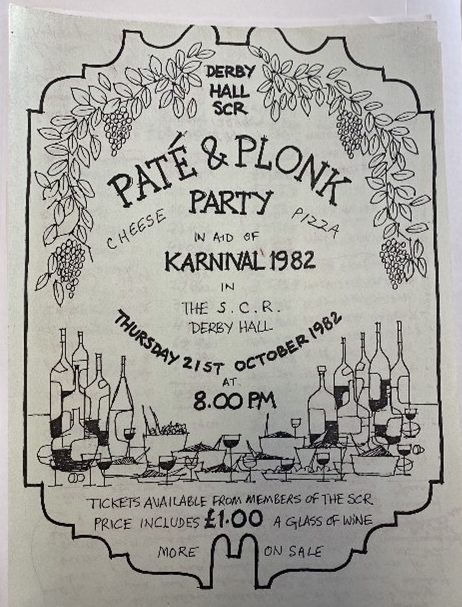
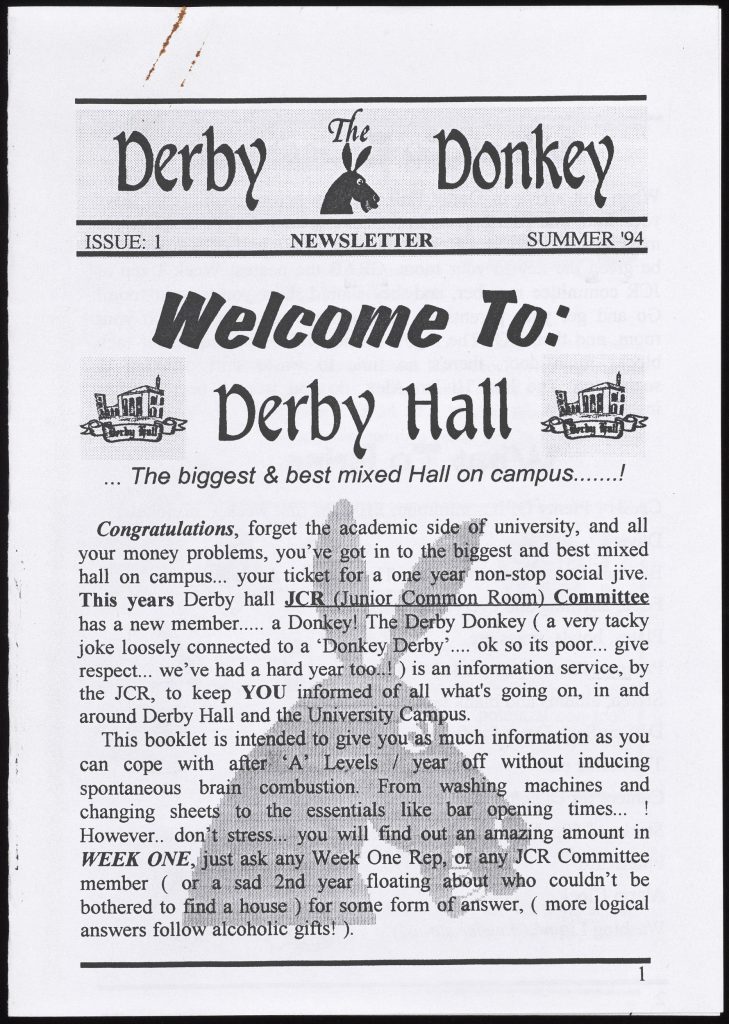
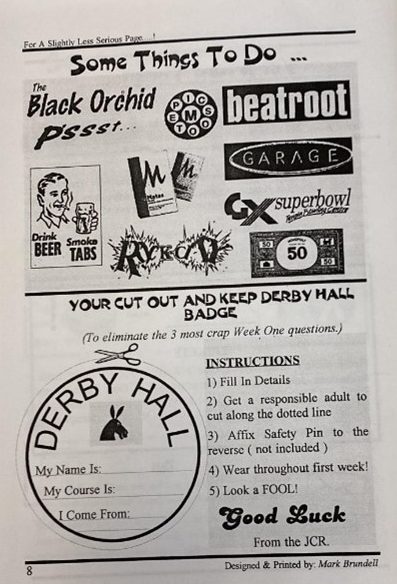

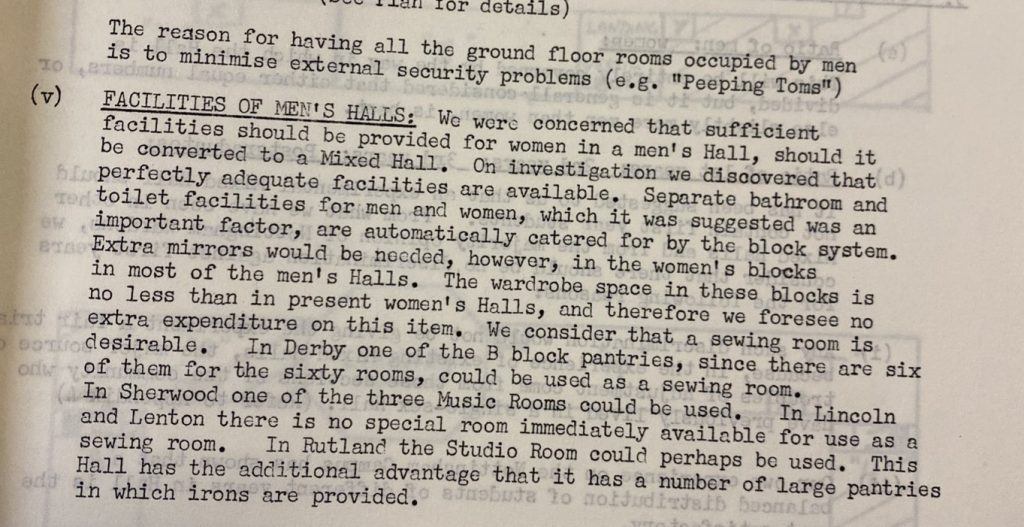

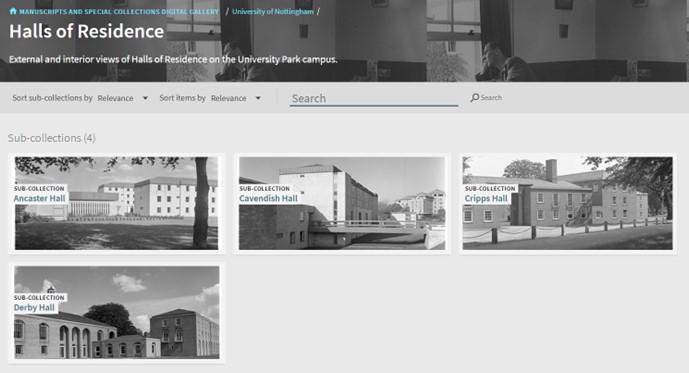
Leave a Reply